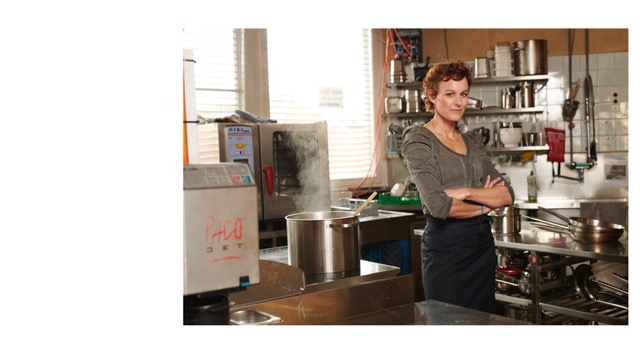
CITY TALK WITH LAUREN WILDBOLZ
She has opened the first vegan restaurant in Switzerland and sometimes cooks entire menus with food that she rescues from containers: Lauren Wildbolz runs a catering company and organizes encounters between art and cuisine.
Lauren, what can we expect in 2023 based on your plans?
It is to be expected that the trend towards a plant-based diet in Switzerland and Europe will become even stronger in 2023, and it is quite possible that almost half of our diet will soon be purely plant-based.
More and more people will discover the health, ethical and environmental benefits of a plant-based diet and decide to reduce or completely give up their meat and dairy consumption.
The food industry has recognized that the production of plant-based products makes more sense due to their longer shelf life and fewer problems with bacteria and salmonella.
It is therefore in the interests of the industry to promote these products. As a result, plant-based products are available in more and more supermarkets, restaurants and cafés.
In 2023, a plant-based diet will move even further into the mainstream and there will be a wider range of plant-based products that hardly differ from animal products in terms of taste and texture.
Particular attention will be paid to sustainable production and the avoidance of unnecessary additives.
Molecular milk is expected to be a major game changer, especially for convenience food and baked goods, as many products or ready meals can be veganized as a result.
There will also be a greater choice of plant-based dishes in the catering trade, as more products will finally be available in larger units.
Veganz, for example, will be launching a gastro line with bar eggs on the market.
At the same time, the debate on the environmental impact of animal husbandry and climate change will continue, which will further raise awareness of these issues.
More and more people will therefore opt for a largely plant-based diet, which has a positive impact on the environment.
If we look into a culinary future together, what is your outlook and what do you wish for?
In the future, the focus will be even more on plant-based and alternative proteins. There will be a variety of new products based on nuts, kernels, seeds, pulses, mushrooms or algae that are an excellent source of protein.
The use of precision fermentation and cellular-produced meat (clean meat) will continue to increase and lead to a rethought diet: Our understanding of meat and fish, as well as milk and eggs, will change completely.
The personalization of food and nutrition plans will also play a greater role:
Thanks to advances in genetic engineering and the analysis of metabolic processes, it will be possible to tailor nutrition plans to individual needs and preferences.
Digitalization and automation in the food industry will also continue to advance. The use of robots and artificial intelligence in food production will lead to higher product efficiency and quality.
Another trend will be sustainability and resource conservation in food production. More use will be made of local and seasonal foods in order to minimize transport routes and reduce the environmental impact.
The use of recycled materials and the avoidance of packaging waste will also become more important.
Overall, the culinary future will be characterized by a wide variety of innovative and sustainable products and production processes that take individual needs into account and have a positive impact on the environment.
In my opinion, the two keywords reduction and innovation are inextricably linked when it comes to the future of cuisine.
Without a reduction in food consumption overall and simultaneous innovation in the production and development of future-oriented products, we will face major challenges.
The combination of these two factors will enable us to create a sustainable and future-oriented culinary landscape that meets the needs of people and the environment in equal measure

What do you think of the current meat alternatives? Curse or blessing?
A blessing for meat eaters!
You supervise and coach female chefs. What experiences have you had with female chefs over the years? How is “plant-based” implemented in the catering industry (in your opinion)?
Most cooks are initially skeptical when it comes to preparing plant-based dishes. They often have no experience with this type of cooking and are unsure how to handle the ingredients.
I always explain to them that they don’t need to relearn their cooking skills and that they actually have all the skills they need to prepare plant-based dishes.
It’s more about rethinking and using the right products. Because if you take the same care when preparing vegan dishes as you do with meat dishes, they will taste just as good.
Of course, the highest art is to make something “crass” out of vegetables, but not every company needs that.
For a classic down-to-earth Swiss specialty restaurant, I recommend a vegan Züri Geschnetzeltes with spelt seitan, for example.
It is important that the vegan dishes match the business and the target group and are therefore authentic.
In my “Plant-based Inspiration for Professionals” program, chefs can see how delicious and varied plant-based dishes can be. Afterwards, they are enthusiastic and open to new ideas.
It is crucial to focus not on the omission of animal products, but on the variety, opulence and new culinary taste experiences that vegan dishes can offer
What are these deliciously colorful Kubo cubes all about?
Vegan desserts in restaurants are often hard to find, as most establishments don’t bother to make desserts without egg, milk and butter.
It often remains a simple sorbet or fruit salad for dessert. But this is where Kubo comes in and offers a solution for any restaurant that doesn’t want to spend a lot of time making vegan desserts.
I have developed five special patisserie cubes that have been specially produced for the catering industry.
Kubo Classic, for example, is a delicious combination of wild Swiss blueberries, mango and apricots, infused with a creamy ganache and crunchy chocolate bases.
Each Kubo is a feast for the senses and is replaced every three months by a seasonal Kubo (see picture).
The best thing about Kubo is that there is no food waste as it is a frozen product, but it is super quick to temper in the kitchen and ready to serve!
The restaurateur can include Kubo on his dessert menu and vary it with different flavors depending on the season.
If no kubo is ordered one evening, it can simply be stored in the freezer without going bad.
With Kubo, restaurants can offer their customers a unique and delicious vegan dessert without having to invest a lot of time and resources.
Kubo Classic and the matching season will soon be listed at Gmür and Transgourmet and can already be ordered in larger units directly from Deliciel: ronald.aeschbach(at)deliciel.com

